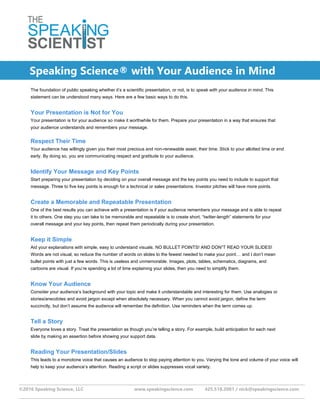
Speaking Science with Your Audience in Mind 072516
- 1. ___________________________________________________________________________________________________________________________ ©2016 Speaking Science, LLC www.speakingscience.com 425.518.2081 / nick@speakingscience.com ___________________________________________________________________________________________________________________________ The foundation of public speaking whether it’s a scientific presentation, or not, is to speak with your audience in mind. This statement can be understood many ways. Here are a few basic ways to do this. Your Presentation is Not for You Your presentation is for your audience so make it worthwhile for them. Prepare your presentation in a way that ensures that your audience understands and remembers your message. Respect Their Time Your audience has willingly given you their most precious and non-renewable asset, their time. Stick to your allotted time or end early. By doing so, you are communicating respect and gratitude to your audience. Identify Your Message and Key Points Start preparing your presentation by deciding on your overall message and the key points you need to include to support that message. Three to five key points is enough for a technical or sales presentations. Investor pitches will have more points. Create a Memorable and Repeatable Presentation One of the best results you can achieve with a presentation is if your audience remembers your message and is able to repeat it to others. One step you can take to be memorable and repeatable is to create short, “twitter-length” statements for your overall message and your key points, then repeat them periodically during your presentation. Keep it Simple Aid your explanations with simple, easy to understand visuals. NO BULLET POINTS! AND DON”T READ YOUR SLIDES! Words are not visual, so reduce the number of words on slides to the fewest needed to make your point… and I don’t mean bullet points with just a few words. This is useless and unmemorable. Images, plots, tables, schematics, diagrams, and cartoons are visual. If you’re spending a lot of time explaining your slides, then you need to simplify them. Know Your Audience Consider your audience’s background with your topic and make it understandable and interesting for them. Use analogies or stories/anecdotes and avoid jargon except when absolutely necessary. When you cannot avoid jargon, define the term succinctly, but don’t assume the audience will remember the definition. Use reminders when the term comes up. Tell a Story Everyone loves a story. Treat the presentation as though you’re telling a story. For example, build anticipation for each next slide by making an assertion before showing your support data. Reading Your Presentation/Slides This leads to a monotone voice that causes an audience to stop paying attention to you. Varying the tone and volume of your voice will help to keep your audience’s attention. Reading a script or slides suppresses vocal variety. Speaking Science® with Your Audience in Mind
- 2. ___________________________________________________________________________________________________________________________ ©2016 Speaking Science, LLC www.speakingscience.com 425.518.2081 / nick@speakingscience.com ___________________________________________________________________________________________________________________________ Too Much Information Loading your slides with too much information and having to navigate your audience through them exhausts a speaker and overwhelms an audience. Adding commentary in addition to the notes on slides does not help. Instead, treat the presentation like a narrative or story and use slides to provide mental images that AID the narrative. This is a powerful way of keeping your audience engaged in your talk. The Coffee Talk exercise described later is a great way to develop your narrative. Forgetting Your Information Being unable to recall too many details not explicitly stated on slides can look as though you don’t know what you’re doing. You won’t necessarily remember every detail about your experiments, but the more you’re able to recall when questioned, the more confident others will be in your results, your understanding of your work, and your ability as a scientist. Conveying Uncertainty How do you respond to the audience’s questions? It’s best to ALWAYS BE HONEST AND CONFIDENT IN YOUR ANSWER. Sounding unsure or negative doesn’t give the audience confidence in your work. It might even suggest that you’re hiding something. Even if you don’t know the answer to a question, say, with confidence, “I don’t know.” Follow that up with “…but here’s what I think…” Understand, however, that the “…but here’s what I think…” part of your answer is interpreted as thinking by other scientists, but is likely to be received as fact by most everyone else. Being Too Complex You will most certainly be judged by how well you can simplify an idea. Simplifying a complex idea is the ultimate demonstration of how well you understand it. Note that it’s easy to make something complicated, but it’s hard to make something simple. The work needed to simplify an idea is well worth it, especially in a presentation. Losing Sight of the Big Picture Be able to explain why you’re doing the work you’re presenting at a higher level than what you find in an objective statement. In other words, never lose sight of the big picture. Why are you doing what you’re doing? How does it relate to the big picture? Keep this in mind when you’re presenting, even if it’s not necessary to explicitly state it in a presentation. Coffee Talk The ultimate test of winning your audience’s confidence in your abilities and results is whether you can still “tell the story of your work” if the technology you’re relying on fails. Can you communicate your message without these aids? I call this exercise Coffee Talk because it’s similar to the way you would explain your work to someone over a cup of coffee. It will force you to select the simplest and most succinct manner in which to make your points. Start with Coffee Talk the next time you prepare a presentation. It will build the framework for your talk—then add visuals and polish. All the best on your next presentation! Want help preparing for an important presentation with money at stake? Contact Dr. Nick Milanovich, The Speaking Scientist®, at 425.518.2081 or nick@speakingscience.com.